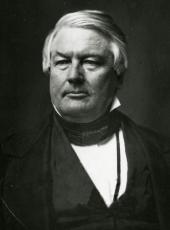WASHINGTON CITY, May, 20th 1852.
My Dear Sir,
Yours of the 12th inst. came duly to hand, but I have delayed answering it, for the purpose of seeing a translation of Mr. Hiilsemann's letter, which I did not get until yesterday. I am exceedingly gratified to learn that your injury was not so severe but that we may soon hope to see you with us again. The anecdote, which you relate of your old friend who watched you so intently in the moment of danger, is truly touching, and the graphic manner in which you have described it presents a scene, which would form a beautiful subject for a painting. It must have been some gratification, at least, amid your afflictions to witness the universal sympathy at your misfortune, and the deep interest which everyone took in your recovery. I perceive, by the papers, that you are soon to speak at Faneuil Hall, and I therefore infer, that, with the exception of your hands and arms, you are quite recovered.
In regard to a further reply to Mr. Hiilsemann's letter we will consider of that when you return. My own impression is, however, that the most dignified as well as expedient course for us, will be, to limit the reply or communication to Mr. Me. Curdy to that part of it which complains of the disclosure of his communications by the State Department. Mr. Bodisco expressed a doubt to me whether he is the "Hiilsemann," the Author of the Travels in America, which were so justly and severely criticised in the North American Review. But whether he be or not, it seems to me that he is hardly worth, as you say, "a discharge of the lower tier," and it might serve further to irritate the Austrian Government, with which it is our interest, if possible, to be on good terms.
The Mexican Minister has not yet been received, but probably will be on Saturday. I have a copy of his address, which is quite general with warm professions of friendship and a desire to maintain amicable relations between the two governments. I am a little apprehensive, from what President Arista Bays in his letter to me, that Mr. Letcher went farther than was intended, in threatening the Mexican government with an interruption of our peaceful relations in case she did not ratify the treaty. By assuming to treat with her, we certainly conceded, that she had a right either to adopt or reject the treaty. It was our duty, as well to the Tehuantepec Company as to the United States, to make every reasonable effort to secure this right of way and protect whatever rights the Company might have under the Garay grant, but the rights of the Company, like the rights of every other contractor with a foreign nation, or its subjects, are rights growing out of a private contract, and if the Mexican government refuses to fulfil that contract, the proprietors doubtless have a claim for pecuniary indemnity, but that is to be settled, like every other claim of this kind that our citizens may have against a foreign government. President Arista insists, that they are willing to grant the right of way to our citizens, or others, who will construct the railroad. But I infer, that the great objection to the Garay grant consists in the fact, that a large territory was granted with it, on each side of the proposed railroad, and a much larger territory was to be open to colonization, and that the Mexicans were justly apprehensive, that if the Americans established so large a colony on the Southern borders of their territory, that it might turn out to be another Texan colony which would involve their nation in war, and might result in another annexation; and, considering what has passed, these apprehensions were not unreasonable— Since you left, Mr. Hargous has submitted a proposition on the subject, which if adopted by the Administration, and sanctioned by Congress, would, I doubt not, finally result in a war between the two countries. Certainly nothing has been left undone, that could have been done, to secure the rights of the Company and guarantee them by a treaty between Mexico and the United States; but the treaty has failed, and under such circumstances, that I am satisfied, that it can never be ratified, and I shall therefore now wait to see what propositions the new Mexican minister is authorized to make, and I doubt not you will be here before it is necessary to consider them.
I handed your letter to Mr. Hunter that he might copy for you that part of it which you desire. The weather is yet quite cool, and a fire is not uncomfortable in the morning. It would be agreeable at all times to have you here, and especially at the Council board, but yet there is nothin o' particularly pressing, and I beg of you, to make yourself contented and happy, without any unnecessary anxiety about matters here, until you shall feel your self perfectly restored and able to return, when I shall be most happy to welcome you.
I am your obt. servt.
MILLARD FILLMORE.
SOURCE: The Letters of Daniel Webster. Edited by C.H. Van Tyne. McClure, Phillips & Co. New York. 1902.
Millard Fillmore, Letter to Secretary of State Daniel Webster Online by Gerhard Peters and John T. Woolley, The American Presidency Project https://www.presidency.ucsb.edu/node/378120

